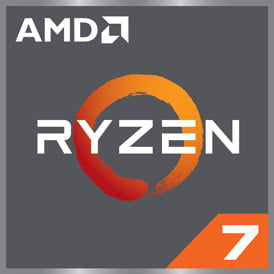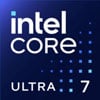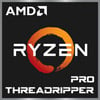
AMD Ryzen 7 8700G Benchmark, Test and specs
Last updated:
The AMD Ryzen 7 8700G has 8 cores with 16 threads and is based on the 6. gen of the AMD Ryzen 7 series. The processor uses a mainboard with the AM5 (LGA 1718) socket and was released in Q1/2024. The AMD Ryzen 7 8700G scores 2,014 points in the Geekbench 5 single-core benchmark. In the Geekbench 5 multi-core benchmark, the result is 13,217 points.

| Name: | AMD Ryzen 7 8700G |
|---|---|
| Family: | AMD Ryzen 7 (67) |
| CPU group: | AMD Ryzen 8000G (12) |
| Architecture: | Phoenix (Zen 4) |
| Segment: | Desktop / Server |
| Generation: | 6 |
| Predecessor: | AMD Ryzen 7 5700G |
| Successor: | -- |
CPU Cores and Base Frequency
The AMD Ryzen 7 8700G has 8 CPU cores and can calculate 16 threads in parallel. The clock frequency of the AMD Ryzen 7 8700G is 4.20 GHz (5.10 GHz). The number of CPU cores greatly affects the speed of the processor and is an important performance indicator.
| CPU Cores / Threads: | 8 / 16 |
|---|---|
| Core architecture: | normal |
| Cores: | 8x Zen 4 |
| Hyperthreading / SMT: | Yes |
|---|---|
| Overclocking: | Yes |
| Frequency: | 4.20 GHz |
| Turbo Frequency (1 Core): | 5.10 GHz |
| Turbo Frequency (8 Cores): | 4.70 GHz |
Artificial Intelligence and Machine Learning
Processors with the support of artificial intelligence (AI) and machine learning (ML) can process many calculations, especially audio, image and video processing, much faster than classic processors. Algorithms for ML improve their performance the more data they have collected via software. ML tasks can be processed up to 10,000 times faster than with a classic processor.
| AI hardware: | AMD Ryzen AI |
|---|---|
| AI specifications: | AMD dedicated AI XDNA Technology @ 16 TOPS |
Internal Graphics
The AMD Ryzen 7 8700G has integrated graphics, called iGPU for short. Specifically, the AMD Ryzen 7 8700G uses the AMD Radeon 780M, which has 768 texture shaders and 12 execution units. The iGPU uses the system's main memory as graphics memory and sits on the processor's die.
| GPU name: | AMD Radeon 780M |
|---|---|
| GPU frequency: | 0.80 GHz |
| GPU (Turbo): | 2.90 GHz |
| Compute units: | 12 |
| Shader: | 768 |
| Hardware Raytracing: | Yes |
| Release date: | Q1/2023 |
| Max. displays: | 4 |
|---|---|
| Generation: | 3 |
| Direct X: | 12 |
| Technology: | 4 nm |
| Max. GPU Memory: | 32 GB |
| Frame Generation: | AMD FSR |
Hardware codec support
A photo or video codec that is accelerated in hardware can greatly accelerate the working speed of a processor and extend the battery life of notebooks or smartphones when playing videos.
| h265 / HEVC (8 bit): | Decode / Encode |
|---|---|
| h265 / HEVC (10 bit): | Decode / Encode |
| h264: | Decode / Encode |
| VP8: | Decode |
| VP9: | Decode |
| AV1: | Decode / Encode |
|---|---|
| AVC: | Decode |
| VC-1: | Decode |
| JPEG: | Decode / Encode |
Memory & PCIeThe processor can use up to 256 GB memory in 2 (Dual Channel) memory channels. The maximum memory bandwidth is 83.2 GB/s. The memory type as well as the amount of memory can greatly affect the speed of the system. |
|
| Memory type: | Memory bandwidth: |
|---|---|
| DDR5-5200 | 83.2 GB/s |
| Max. Memory: | 256 GB |
| Memory channels: | 2 (Dual Channel) |
| ECC: | No |
| PCIe: | 4.0 x 20 |
| PCIe Bandwidth: | 39.4 GB/s |
Thermal ManagementThe thermal design power (TDP for short) of the processor is 65 W. The TDP specifies the necessary cooling solution that is required to cool the processor sufficiently. The TDP usually gives a rough idea of the actual power consumption of the CPU. |
|
|---|---|
| TDP (PL1 / PBP): | 65 W |
| TDP (PL2): | -- |
| TDP up: | -- |
| TDP down: | 45 W |
| Tjunction max.: | 95 °C |
Technical details
The AMD Ryzen 7 8700G is made in 4 nm. The smaller the manufacturing process of a CPU, the more modern and energy-efficient it is. Overall, the processor has 24.00 MB cache. A large cache can greatly speed up the processor's speed in some cases such as games.
| Technology: | 4 nm |
|---|---|
| Chip design: | Monolithic |
| Socket: | AM5 (LGA 1718) |
| L2-Cache: | 8.00 MB |
| L3-Cache: | 16.00 MB |
| AES-NI: | Yes |
| Operating systems: | Windows 10, Windows 11, Linux |
| Virtualization: | AMD-V, SVM |
|---|---|
| Instruction set (ISA): | x86-64 (64 bit) |
| ISA extensions: | SSE4a, SSE4.1, SSE4.2,FMA3, AVX2, AVX512 |
| Release date: | Q1/2024 |
| Release price: | 329 $ |
| Part Number: | 100-100001236 |
| Documents: | Technical data sheet |
Rate this processor
Benchmark results

The benchmark results for the AMD Ryzen 7 8700G have been carefully checked by us. We only publish benchmark results that have been created by us or that have been submitted by a visitor and then checked by a team member. All results are based on and fullfill our benchmark guidelines.
Screenshots:
Screenshots:
- Geekbench 5.3.1 (32 GB DDR5), Windows 10 Pro
- Geekbench 6.2.2 on ASUS ROG STRIX B650-A GAMING WIFI (32 GB DDR5-6400), Windows 11 Pro
Cinebench 2024 (Single-Core)
The Cinebench 2024 benchmark is based on the Redshift rendering engine, which is also used in Maxon's 3D program Cinema 4D. The benchmark runs are each 10 minutes long to test whether the processor is limited by its heat generation.

|
Intel Core i5-12600K
10C 16T @ 4.90 GHz |
||

|
Intel Core i5-12600KF
10C 16T @ 4.90 GHz |
||

|
Intel Core i7-13700H
14C 20T @ 5.00 GHz |
||
|
|
AMD Ryzen 7 8700G
8C 16T @ 5.10 GHz |
||

|
AMD Ryzen 7 PRO 8700G
8C 16T @ 5.10 GHz |
||

|
Intel Core i5-13500HX
14C 20T @ 4.70 GHz |
||

|
Intel Core i5-13500H
12C 16T @ 4.70 GHz |
||
Cinebench 2024 (Multi-Core)
The Multi-Core test of the Cinebench 2024 benchmark uses all cpu cores to render using the Redshift rendering engine, which is also used in Maxons Cinema 4D. The benchmark run is 10 minutes long to test whether the processor is limited by its heat generation.

|
Intel Core i7-12700
12C 20T @ 4.90 GHz |
||

|
Intel Core i7-12700F
12C 20T @ 4.90 GHz |
||

|
Intel Core i9-13900HK
14C 20T @ 5.40 GHz |
||
|
|
AMD Ryzen 7 8700G
8C 16T @ 5.10 GHz |
||

|
AMD Ryzen 7 PRO 8700G
8C 16T @ 5.10 GHz |
||

|
AMD Ryzen Threadripper 1950X
16C 32T @ 4.00 GHz |
||

|
Intel Core i9-13900H
14C 20T @ 5.40 GHz |
||
Cinebench R23 (Single-Core)
Cinebench R23 is the successor of Cinebench R20 and is also based on the Cinema 4 Suite. Cinema 4 is a worldwide used software to create 3D forms. The single-core test only uses one CPU core, the amount of cores or hyperthreading ability doesn't count.

|
AMD Ryzen 9 7845HX
12C 24T @ 5.20 GHz |
||

|
Intel Core i7-1280P
14C 20T @ 4.80 GHz |
||

|
AMD Ryzen 7 7745HX
8C 16T @ 5.10 GHz |
||
|
|
AMD Ryzen 7 8700G
8C 16T @ 5.10 GHz |
||

|
AMD Ryzen 7 PRO 8700G
8C 16T @ 5.10 GHz |
||

|
AMD Ryzen 5 7500F
6C 12T @ 5.00 GHz |
||

|
Intel Core i7-1360P
12C 16T @ 5.00 GHz |
||
Cinebench R23 (Multi-Core)
Cinebench R23 is the successor of Cinebench R20 and is also based on the Cinema 4 Suite. Cinema 4 is a worldwide used software to create 3D forms. The multi-core test involves all CPU cores and taks a big advantage of hyperthreading.

|
Intel Core i9-12900HK
14C 20T @ 3.80 GHz |
||

|
AMD Ryzen 9 3900X
12C 24T @ 4.00 GHz |
||

|
AMD Ryzen 7 7745HX
8C 16T @ 3.60 GHz |
||
|
|
AMD Ryzen 7 8700G
8C 16T @ 4.70 GHz |
||

|
AMD Ryzen 7 PRO 8700G
8C 16T @ 4.70 GHz |
||

|
Intel Xeon E5-2683 v3
14C 28T @ 2.50 GHz |
||

|
AMD Ryzen 7 7800X3D
8C 16T @ 4.60 GHz |
||
Geekbench 5, 64bit (Single-Core)
Geekbench 5 is a cross plattform benchmark that heavily uses the systems memory. A fast memory will push the result a lot. The single-core test only uses one CPU core, the amount of cores or hyperthreading ability doesn't count.

|
Intel Core i5-14600K
14C 20T @ 5.30 GHz |
||

|
Intel Core i5-14600KF
14C 20T @ 5.30 GHz |
||

|
Intel Core i7-14700HX
20C 28T @ 5.50 GHz |
||
|
|
AMD Ryzen 7 8700G
8C 16T @ 5.10 GHz |
||

|
AMD Ryzen 7 PRO 8700G
8C 16T @ 5.10 GHz |
||

|
AMD Ryzen 5 7500F
6C 12T @ 5.00 GHz |
||

|
AMD Ryzen 7 7745HX
8C 16T @ 5.10 GHz |
||
Geekbench 5, 64bit (Multi-Core)
Geekbench 5 is a cross plattform benchmark that heavily uses the systems memory. A fast memory will push the result a lot. The multi-core test involves all CPU cores and taks a big advantage of hyperthreading.

|
Intel Xeon D-2796TE
20C 40T @ 2.50 GHz |
||

|
Intel Core i9-12900E
16C 24T @ 4.00 GHz |
||

|
Apple M3 Pro (11-CPU 14-GPU)
11C 11T @ 3.80 GHz |
||
|
|
AMD Ryzen 7 8700G
8C 16T @ 4.70 GHz |
||

|
AMD Ryzen 7 PRO 8700G
8C 16T @ 4.70 GHz |
||

|
Intel Core Ultra 7 165H
16C 22T @ 4.40 GHz |
||

|
Intel Xeon W-3235
12C 24T @ 4.00 GHz |
||
Geekbench 6 (Single-Core)
Geekbench 6 is a benchmark for modern computers, notebooks and smartphones. What is new is an optimized utilization of newer CPU architectures, e.g. based on the big.LITTLE concept and combining CPU cores of different sizes. The single-core benchmark only evaluates the performance of the fastest CPU core, the number of CPU cores in a processor is irrelevant here.

|
Intel Core i9-13950HX
24C 32T @ 5.50 GHz |
||

|
AMD Ryzen 7 7800X3D
8C 16T @ 5.00 GHz |
||

|
Intel Core i7-14700T
20C 28T @ 5.20 GHz |
||
|
|
AMD Ryzen 7 8700G
8C 16T @ 5.10 GHz |
||

|
AMD Ryzen 7 PRO 8700G
8C 16T @ 5.10 GHz |
||

|
AMD Ryzen Threadripper PRO 7995WX
96C 192T @ 5.10 GHz |
||

|
Intel Core i9-13900HX
24C 32T @ 5.40 GHz |
||
Geekbench 6 (Multi-Core)
Geekbench 6 is a benchmark for modern computers, notebooks and smartphones. What is new is an optimized utilization of newer CPU architectures, e.g. based on the big.LITTLE concept and combining CPU cores of different sizes. The multi-core benchmark evaluates the performance of all of the processor's CPU cores. Virtual thread improvements such as AMD SMT or Intel's Hyper-Threading have a positive impact on the benchmark result.

|
Intel Core i7-13850HX
20C 28T @ 4.40 GHz |
||

|
Intel Core i7-14650HX
16C 24T @ 2.20 GHz |
||

|
AMD EPYC 7542
32C 64T @ 3.20 GHz |
||
|
|
AMD Ryzen 7 8700G
8C 16T @ 4.70 GHz |
||

|
AMD Ryzen 7 PRO 8700G
8C 16T @ 4.70 GHz |
||

|
AMD Ryzen 7 7800X3D
8C 16T @ 4.60 GHz |
||

|
Apple M2 Max (30-GPU)
12C 12T @ 3.50 GHz |
||
Cinebench R20 (Single-Core)
Cinebench R20 is the successor of Cinebench R15 and is also based on the Cinema 4 Suite. Cinema 4 is a worldwide used software to create 3D forms. The single-core test only uses one CPU core, the amount of cores or hyperthreading ability doesn't count.

|
AMD Ryzen 5 7600
6C 12T @ 5.10 GHz |
||

|
Intel Core i9-12900HK
14C 20T @ 5.00 GHz |
||

|
AMD Ryzen 5 7500F
6C 12T @ 5.00 GHz |
||
|
|
AMD Ryzen 7 8700G
8C 16T @ 5.10 GHz |
||

|
AMD Ryzen 7 PRO 8700G
8C 16T @ 5.10 GHz |
||

|
Intel Core i7-1280P
14C 20T @ 4.80 GHz |
||

|
AMD Ryzen 5 PRO 8600G
6C 12T @ 5.00 GHz |
||
Cinebench R20 (Multi-Core)
Cinebench R20 is the successor of Cinebench R15 and is also based on the Cinema 4 Suite. Cinema 4 is a worldwide used software to create 3D forms. The multi-core test involves all CPU cores and taks a big advantage of hyperthreading.

|
Intel Core i9-12900HX
16C 24T @ 2.30 GHz |
||

|
Intel Core i7-12700H
14C 20T @ 3.80 GHz |
||

|
Intel Core i7-12700HL
14C 20T @ 3.80 GHz |
||
|
|
AMD Ryzen 7 8700G
8C 16T @ 4.70 GHz |
||

|
AMD Ryzen 7 PRO 8700G
8C 16T @ 4.70 GHz |
||

|
AMD Ryzen Threadripper 2950X
16C 32T @ 3.50 GHz |
||

|
AMD Ryzen 9 3900X
12C 24T @ 4.00 GHz |
||
iGPU - FP32 Performance (Single-precision GFLOPS)
The theoretical computing performance of the internal graphics unit of the processor with simple accuracy (32 bit) in GFLOPS. GFLOPS indicates how many billion floating point operations the iGPU can perform per second.

|
Apple M1 Pro (8-CPU)
Apple M1 Pro (14 Core) @ 1.30 GHz |
||

|
Intel Core Ultra 7 165H
Intel Iris Xe 8 Core Graphics 128 EUs (Meteor Lake) @ 2.30 GHz |
||

|
Intel Core Ultra 7 165HL
Intel Iris Xe 8 Core Graphics 128 EUs (Meteor Lake) @ 2.30 GHz |
||
|
|
AMD Ryzen 7 8700G
AMD Radeon 780M @ 2.90 GHz |
||

|
AMD Ryzen 7 PRO 8700GE
AMD Radeon 780M @ 2.90 GHz |
||

|
AMD Ryzen 7 PRO 8700G
AMD Radeon 780M @ 2.90 GHz |
||

|
Intel Core Ultra 7 155HL
Intel Iris Xe 8 Core Graphics 128 EUs (Meteor Lake) @ 2.25 GHz |
||
Estimated results for PassMark CPU Mark
Some of the CPUs listed below have been benchmarked by CPU-monkey. However the majority of CPUs have not been tested and the results have been estimated by a CPU-monkey’s secret proprietary formula. As such they do not accurately reflect the actual Passmark CPU mark values and are not endorsed by PassMark Software Pty Ltd.

|
Intel Core i7-13650HX
14C 20T @ 4.40 GHz |
||

|
AMD Ryzen Threadripper 2990WX
32C 64T @ 3.00 GHz |
||

|
Intel Core i9-9980XE
18C 36T @ 4.00 GHz |
||
|
|
AMD Ryzen 7 8700G
8C 16T @ 4.70 GHz |
||

|
AMD Ryzen 7 PRO 8700G
8C 16T @ 4.70 GHz |
||

|
Intel Xeon W-3265M
24C 48T @ 3.60 GHz |
||

|
Intel Core i9-13900H
14C 20T @ 5.00 GHz |
||
CPU performance per watt (efficiency)
Efficiency of the processor under full load in the Cinebench R23 (multi-core) benchmark. The benchmark result is divided by the average energy required (CPU package power in watts). The higher the value, the more efficient the CPU is under full load.

|
Intel Core Ultra 7 155H
16,825 CB R23 MC @ 75 W |
||

|
Intel Core i5-1235U
7,852 CB R23 MC @ 35 W |
||

|
AMD Ryzen 5 7530U
8,346 CB R23 MC @ 38 W |
||
|
|
AMD Ryzen 7 8700G
18,040 CB R23 MC @ 83 W |
||

|
AMD Ryzen 7 PRO 8700G
18,040 CB R23 MC @ 83 W |
||

|
Intel Core i9-13900H
18,760 CB R23 MC @ 87 W |
||

|
AMD Ryzen 7 7700
19,540 CB R23 MC @ 92 W |
||
Performance for Artificial Intelligence (AI) and Machine Learning (ML)
Processors with the support of artificial intelligence (AI) and machine learning (ML) can process many calculations, especially audio, image and video processing, much faster than classic processors. The performance is given in the number (trillions) of arithmetic operations per second (TOPS).

|
Apple M1 Ultra (48-GPU)
20C 20T @ 0.60 GHz |
||

|
Apple M1 Ultra (64-GPU)
20C 20T @ 0.60 GHz |
||

|
Apple A16 Bionic
6C 6T @ 3.46 GHz |
||
|
|
AMD Ryzen 7 8700G
8C 16T @ 4.20 GHz |
||

|
AMD Ryzen 7 PRO 8840U
8C 16T @ 3.30 GHz |
||

|
AMD Ryzen 5 PRO 8640HS
6C 12T @ 3.50 GHz |
||

|
AMD Ryzen 5 PRO 8645HS
6C 12T @ 4.30 GHz |
||
Benchmarks

Cinebench 2024 (SC)
272 entries
272 entries

Cinebench 2024 (MC)
271 entries
271 entries

Cinebench R23 (SC)
586 entries
586 entries

Cinebench R23 (MC)
565 entries
565 entries

Geekbench 5 (SC)
2,488 entries
2,488 entries

Geekbench 5 (MC)
2,461 entries
2,461 entries

Geekbench 6 (SC)
1,755 entries
1,755 entries

Geekbench 6 (MC)
1,703 entries
1,703 entries

Cinebench R20 (SC)
656 entries
656 entries

Cinebench R20 (MC)
604 entries
604 entries

FP32 SP (iGPU)
2,042 entries
2,042 entries

3DMark Timespy (iGPU)
516 entries
516 entries

PassMark CPU-Mark
2,392 entries
2,392 entries

CPU performance per watt (efficiency)
109 entries
109 entries

AI / ML Performance
119 entries
119 entries
Description of the processor
The AMD Ryzen 7 8700G is an APU for Socket AM5 from AMD. This APU combines the fast Zen 4 CPU cores of the Vermeer architecture with a fairly fast and integrated graphics unit. The AMD Ryzen 7 8700G has eight CPU cores that are all the same size. AMD does not use a hybrid core structure made up of P-cores and E-cores, as Intel often uses in its newer processors.The 8 CPU cores of the AMD Ryzen 7 8700G clock at 4.2 GHz. Using the processors turbo mode, this clock frequency can be temporarily increased to up to 4.7 GHz (load on all CPU cores) or even up to 5.1 GHz in certain situations. The AMD Ryzen 7 8700G is even overclockable and can be easily adjusted and optimized using the AMD Ryzen Master software from AMD.
The AMD Ryzen 7 8700G uses the AMD Radeon 780M as integrated graphics, which was previously reserved for the faster AMD mobile processors (Phoenix). The graphics unit clocks at up to 2.9 GHz and achieves a performance of 3,100 points in the 3DMark TimeSpy benchmark. This is enough to play more modern games smoothly in resolutions of up to 1080p (Full HD).
Also new in the AM5 socket is the integration of AMD Ryzen AI, AMDs AI hardware acceleration. In the AMD Ryzen 7 8700G, this reaches up to 16 TOPS (trillion operations per second) and can lead to a significant improvement in software that supports AI acceleration.
Up to 256 GB of RAM can be operated with the AMD Ryzen 7 8700G, and up to DDR5-5200 can officially be installed. When using at least two RAM modules (dual-channel mode), a memory bandwidth of up to 83.2 GB/s is achieved. Even faster RAM can be used outside of the manufacturers specifications, which also benefits the performance of the integrated graphics.
Popular comparisons
back to index




